|
|
|
Sort Order |
|
|
|
Items / Page
|
|
|
|
|
|
|
| Srl | Item |
| 1 |
ID:
102399
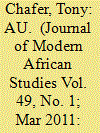

|
|
|
|
|
| Publication |
2011.
|
| Summary/Abstract |
At their 1998 Saint-Malo summit, the UK and French governments promised to set aside a century of rivalry and cooperate more closely on Africa. They also signalled their intention to develop a continent-wide focus on Africa, which would include building up the capacity of regional organisations. They were helped in this latter goal by the winding up of the OAU and its replacement by the AU in 2002. This article therefore examines the extent and nature of Anglo-French cooperation vis-à-vis the AU. It sets out briefly the history of UK and French neglect of the OAU, reviews the key developments that pushed for a more coordinated stance on the AU, and then - drawing on extensive interviews in London, Paris, Brussels, Addis Ababa and Dakar - evaluates the extent of Anglo-French cooperation. It concludes by noting the uneven nature of Anglo-French cooperation vis-à-vis the AU and assesses the reasons for this.
|
|
|
|
|
|
|
|
|
|
|
|
|
|
|
|
| 2 |
ID:
099562
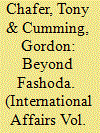

|
|
|
|
|
| Publication |
2010.
|
| Summary/Abstract |
Traditionally divided on security matters, France and Britain broke new ground when they signed the 1998 Saint-Malo agreement, promising to collaborate on defence and security, and pledging to cooperate bilaterally and in a 'bi-multi' fashion on Africa. This Anglo-French collaboration is the focus of this article, which begins by setting out the lack of UK-French security cooperation in Africa from the colonial to the early post-Cold War era. It then shows how there has been a degree of institutionalization of Anglo-French relations, alongside greater cooperation in terms of ESDP missions and the training of African peacekeepers. Next, this study explains the recent evolution of UK-French security relations in terms of neo-classical realist theory. Finally, it assesses the likelihood of closer Anglo-French security collaboration in the future.
|
|
|
|
|
|
|
|
|
|
|
|
|
|
|
|
| 3 |
ID:
005832
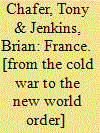

|
|
|
|
|
| Publication |
Houndmills, Macmillan, 1996.
|
| Description |
xvii, 245p.
|
| Standard Number |
033363666X
|
|
|
|
|
|
|
|
|
|
|
|
Copies: C:1/I:0,R:0,Q:0
Circulation
| Accession# | Call# | Current Location | Status | Policy | Location |
| 037267 | 320.944/CHA 037267 | Main | On Shelf | General | |
|
|
|
|
| 4 |
ID:
171707
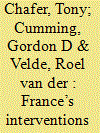

|
|
|
|
|
| Summary/Abstract |
France’s interventions in Mali and the wider Sahel appear to mark a new departure in French military policy in terms of the approach to multilateralism adopted, the regionalisation of the response, and the levels of violence deployed. Yet how ‘new’ is this approach, when set against the historical backdrop of French military interventions in Africa? Should it be seen as a modified version – an adaptation – of the new type of multilateral engagement that emerged in the wake of the 1994 Rwandan genocide? Using a historical institutionalist lens, employing the notions of critical junctures, ‘layering’, and ‘drift’, this article briefly sets out the unilateral approach that marked French military policy in Africa prior to 1994 before going on to analyse the multilateral approach and associated path-dependent practices that emerged after the Rwandan genocide. Drawing on elite interviews in Europe, the US and Africa, the article shows that, while France’s engagement in the Sahel is characterised by an ostensibly novel multilateral approach, it does in fact combine new and old norms, ideas and practices.
|
|
|
|
|
|
|
|
|
|
|
|
|
|
|
|
| 5 |
ID:
108509
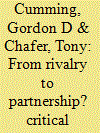

|
|
|
|
|
| Publication |
2011.
|
| Summary/Abstract |
At the December 1998 Saint-Malo summit, Britain and France promised to set aside past rivalries and work together on African issues. While brief indications were given as to possible areas of bilateral and 'bi-multi' cooperation, the terms and scope of this 'partnership' were not spelt out. Was this to involve only sporadic collaboration? Or was it to be an institutionalised partnership, such as the Franco-German tandem, or perhaps a more intuitive alliance, such as the Anglo-American 'special relationship'? These questions are central to this article, which begins by showing how Anglo-French relations in Africa were largely marked by rivalry from the colonial era to the early post-Cold War period. Drawing upon extensive interviews, it demonstrates how, over the last decade or so, closer linkages have developed between the UK and French administrations and how there has been a greater degree of cooperation in response to the key challenges of Africa. It then uses a neo-classical realist framework to explain the readiness or reluctance of Britain and France to collaborate on Africa. It concludes by suggesting that, while there has been progress in 'deconflictualising' African policies, cooperation has been, and is likely to remain, limited.
|
|
|
|
|
|
|
|
|
|
|
|
|
|
|
|
| 6 |
ID:
114750
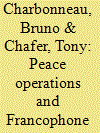

|
|
|
|
|
| Publication |
2012.
|
| Summary/Abstract |
This introductory article presents the history of francophone spaces to critically assess their specificity, and to situate them in academic debates on peace operations. It argues that the specificity is the inescapable a priori context of peace missions, even if this context is rapidly evolving and in interaction with non-francophone spaces. The specificity is nevertheless increasingly difficult to identify, as new practices and conditions emerge and as the lines between different francophone spaces and between francophone and non-francophone spaces are increasingly fluid. The article explores the range of possibilities that emerge from such interrogations, and emphasizes that to add the experiences of 'francophone spaces' to analyses of peace operations is to confront the dynamics of inclusion and exclusion already expressed by the terms 'francophone' and francophonie. This approach points to where and how hegemonic practices move and change between locations and different contexts, and where and how the organization or reorganization of power is negotiated, imposed and/or resisted across 'francophone' and 'non-francophone' spaces.
|
|
|
|
|
|
|
|
|
|
|
|
|
|
|
|
| 7 |
ID:
187504
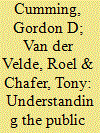

|
|
|
|
|
| Summary/Abstract |
Strategic narratives now face unrealistic expectations as to what they can achieve in the military field. This article asks when and how such narratives lose traction during protracted military interventions. To address these questions, which are crucial at a time when so much modern warfare takes place in the “fourth” dimension, this study develops a conceptual framework that focuses initially on the weakening of a narrative’s content and, subsequently, on its loss of normative resonance and verisimilitude. The latter two factors are beyond the control of even the most skilful strategic narrator, particularly where narratives are required to appeal to audiences with different norms. Our framework is applied to the case of France’s military operations in Mali (Serval) and the Western Sahel (Barkhane). It finds that, whereas France’s compelling Serval narrative was congruent with strong French and Malian public backing, its Barkhane narrative weakened over time, resonating less with prevailing societal norms, becoming less attuned to events on the ground and ultimately coinciding with a sharp decline in public support in France and Mali. It concludes that strategic narratives afford agency to policymakers but are constantly open to contestation and struggle to cope with diverse audiences and deteriorating “evenemential” contexts.
|
|
|
|
|
|
|
|
|
|
|
|
|
|
|
|
|
|
|
|
|